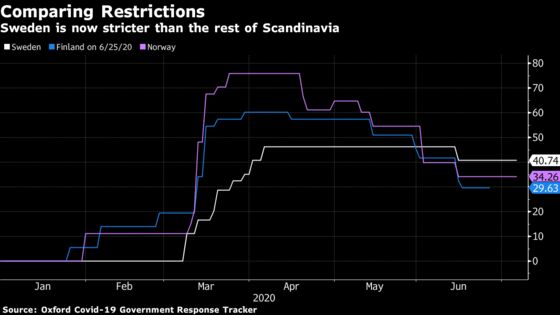Being cagey again? Direct is better, IMO. If you want to argue about "dark matter" and the potential that there's some hidden 20% cap to infections, have at it. But the fact that neighborhoods in NYC and Italy had 50-65% with antibodies and there have been smaller closed populations (prisons, meatpacking plants, etc.) with up to 80% infected, as measured by the viral PCR test, makes that 20% cap seem unlikely. If you want to argue the potential immunity in unexposed people due to T-cell cross-reactivity, that's a much more scientific possibility, but nobody knows yet if that response to COVID in cell cultures of people never exposed to COVID means they have little, some or complete immunity.
Anyway, that test of 50K people was done by a private company and was not randomly drawn from the population, so it was likely not representative of the country's population. In addition, the 14% result was for Stockholm, not for the country, which would be much lower, given the much lower density of the remaining 75% of Sweden's population and lower transmission rates outside of Stockholm.
https://www.thelocal.se/20200618/one-in-seven-stockholmers-had-coronavirus-antibody-in-private-tests
Better data on antibody levels in Sweden are from the blood donor studies, which are more representative than the private tests where people are motivated to get a result because they suspect infection. As of the end of May, 6.3% of Sweden was found to have antibodies and given the low infection rates since then, it's unlikely that more than 7-8% have been infected as of now.
Analysis of samples collected at Week 21 shows that antibodies to covid-19 are detected in 6.3 percent of the studied population. Antibodies continue to be lowest among older adults 65-95 years with 3.9 percent and higher among adults 20-64 years with 7.6 percent and among children 0-19 years with 7.5 percent.
Data at the regional level is presented only for Stockholm, Västra Götaland and Skåne as the number of samples collected for the other regions is less than 100 and therefore cannot give reliable results. In the Stockholm region, Week 21 had the highest proportion of antibody positives with 10.0 percent, followed by Skåne with 4.5 percent and Västra Götaland with 2.7 percent.
http://outbreaknewstoday.com/sweden...fection-antibody-tests-in-blood-donors-98648/
